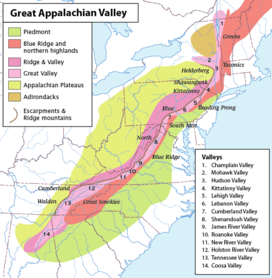
Back Ридж енд Вали Bulgarian Appalačské hřbety a údolí Czech Ridge-and-Valley Appalachians English Valley and Ridge Spanish Ridge-and-valley Appalachians Tagalog Ridge ve Apalaş Dağları Vadisi Turkish
| Lehigh Valley | |
|---|---|
 The Great Appalachian Valley includes the Lehigh Valley (5) depicted south of the Ridge-and-Valley Appalachians and between the Lebanon (6) and Kittatinny (4) valleys. | |
| Area | 726 sq mi (1,880 km2) |
| Geography | |
| Location | Lehigh County Northampton County |
| Population centers | Allentown, Bethlehem, Easton |
| Borders on | Ridge-and-Valley Appalachians Blue Mountain (north) South Mountain (south) Delaware River (east) Lebanon Valley (west) |


The Ridge-and-Valley Appalachians, also called the Ridge and Valley Province or the Valley and Ridge Appalachians, are a part of the larger Appalachian Mountains area.
They are an area in the Appalachians that goes from southeastern New York through northwestern New Jersey, into Pennsylvania and through Maryland, West Virginia, Virginia, Kentucky, Tennessee, Georgia and Alabama. They are between the Blue Ridge Mountains and the Appalachian Plateau (the Allegheny and Cumberland plateaux).
They have long, even ridges with long valleys in between the ridges.
The river valleys were areas where people have lived for thousands of years. The Cherokee people had camps along the rivers in western South Carolina, North Carolina and on the western side Tennessee. The Catawba people lived along the Catawba River in western North Carolina.
The ridge and valley system causes problems when traveling in the area even with today's technology. It was almost impossible for settlers traveling west who walked or rode horses to settle in the Ohio Country, the Northwest Territory and Oregon Country.
Then, animal power was the main form of transportation. There was no safe way to cross east–west in the middle of the area. Crossing was only possible near the ends. There were areas where movement was easier. These included Cumberland Gap, Braddock's Road and Forbes Road. These were later made into America's first National Roads.
Early settlers of the Ohio country was usually entered by the Ohio River. River systems were the main transportation routes. It was difficult in the late 19th and 20th centuries to build railroads and highways through this area.